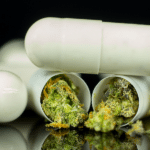Researchers from the Dell Medical School at the University of Texas recently presented an analysis of fatal car crashes in the five years before and after cannabis legalization in Colorado and Washington (2007-2017).
By comparing WA and CO to control states that have had no changes in cannabis laws, they attribute a small increase in the number of crashes to legalization (1-2 more fatal crashes per billion vehicle miles). Their conclusion — that states need “policy strategies to mitigate increasing crash risk” from cannabis legalization is not entirely in line with their data. Their result was not statistically significant unless they restricted their analysis to after the opening of dispensaries. The discrepancy in these results suggests that the rate of cannabis use in the population may be a more important measure than legalization, since “legal cannabis” has a separate incarnation in every US state. Alternatively, the result could be a false positive from one bad statistical choice.
This highlights why pre-registering research proposals is important. If the scientists didn’t plan to test the more narrow timeframe at the outset (and their Statistical Methods section does not suggest they did), then they were likely performing additional tests because their data didn’t support the conclusions they expected. But science isn’t about proving your point, it’s about discovering the truth. Without a pre-registered methodology, readers can’t know if the researchers changed their methods to find a result more compatible with their expectations.
Other groups, such as a Michigan government commission, have found that “no scientifically supported threshold of ∆9-THC bodily content [is] indicative of impaired driving.” There are many possible explanations for the apparent safety of cannabis in drivers, even though cannabis appears to slow reaction time. Some have suggested that stoned drivers drive slower and less aggressively. Others indicate that, after legalization, drivers are less likely to use opioids, benzodiazepines and possibly alcohol, all of which are more impairing for drivers.
Read study: Fatal crashes in the 5 years after recreational marijuana legalization in Colorado and Washington
Adrian Devitt-Lee is a research scientist and longtime Project CBD contributor. © Copyright, Project CBD. May not be reprinted without permission.







